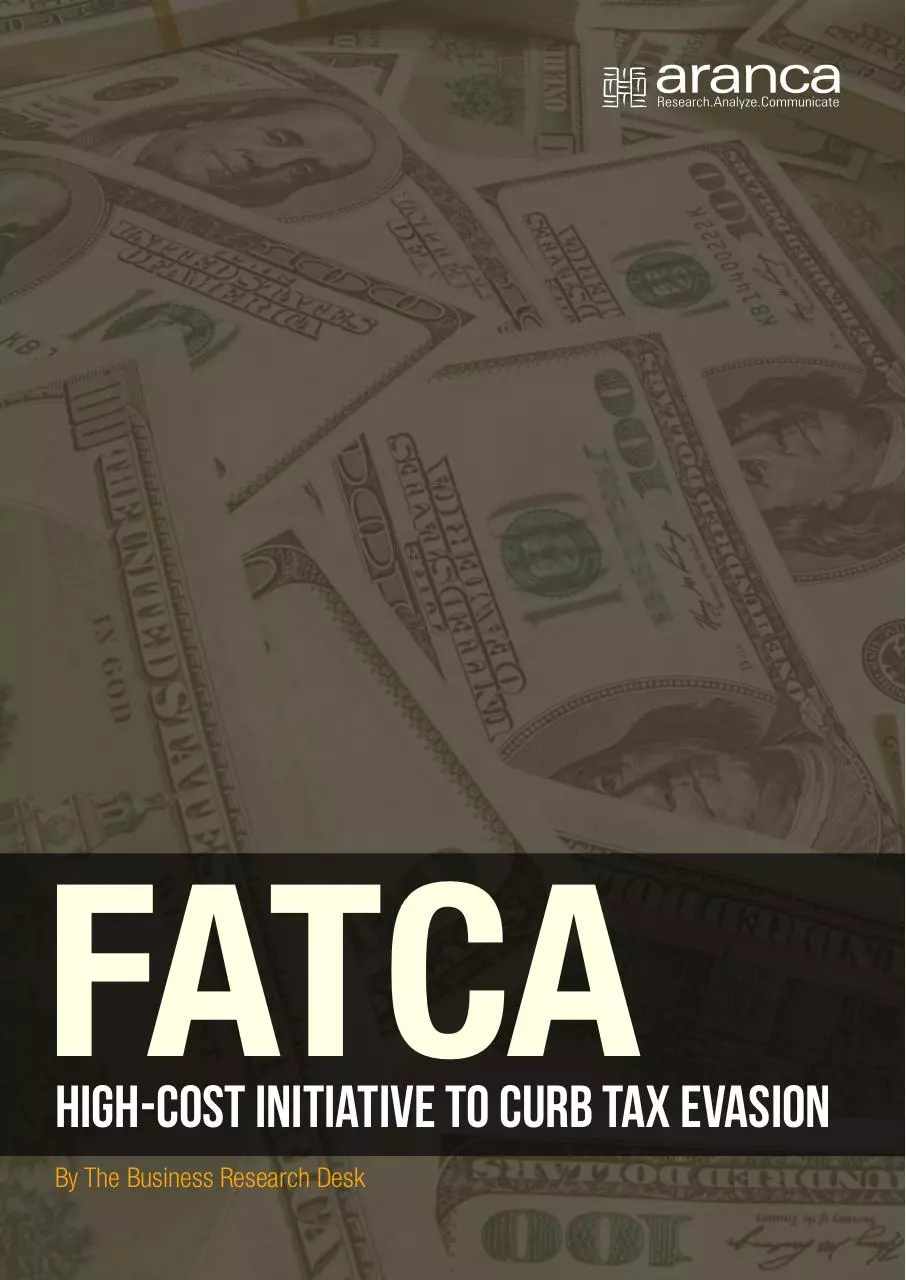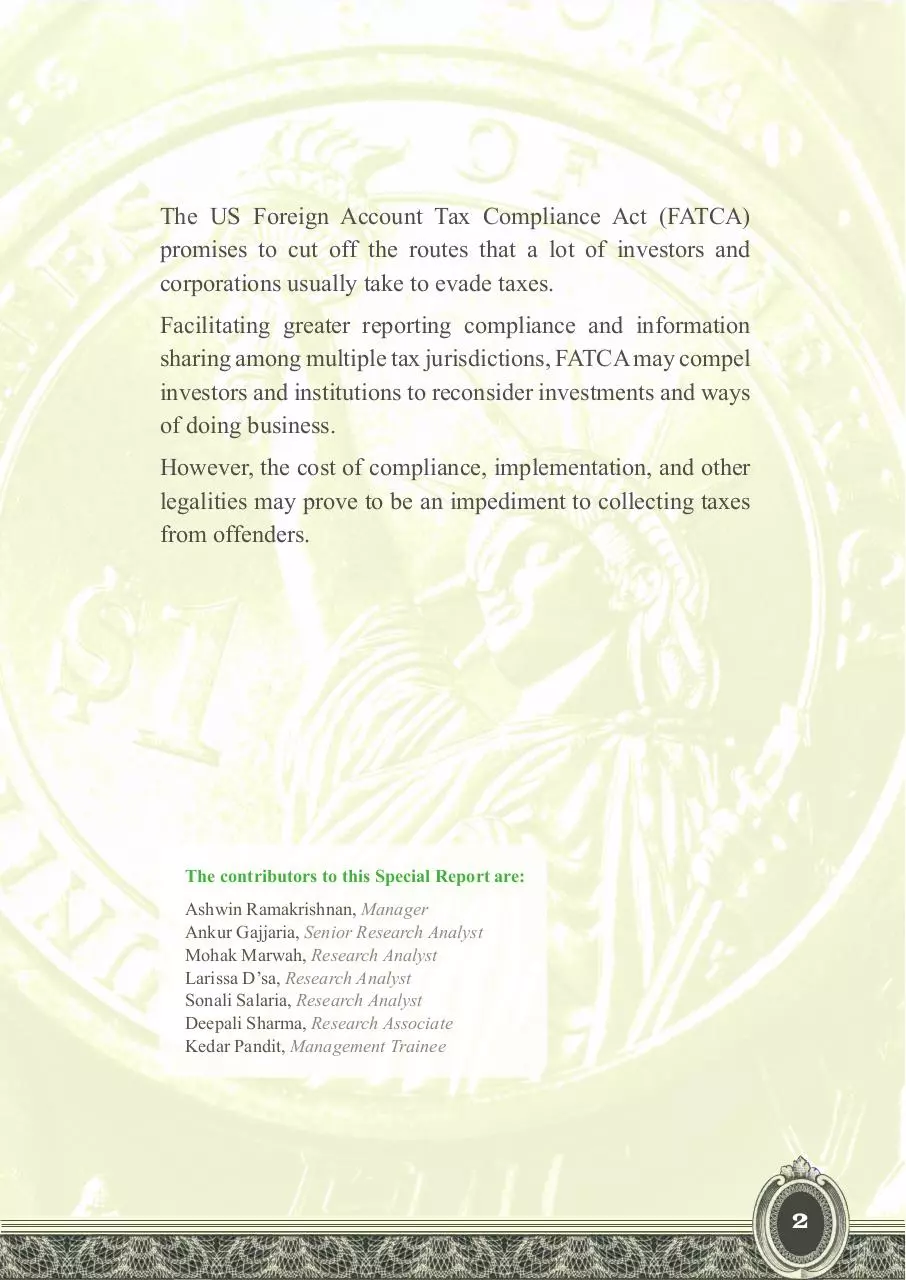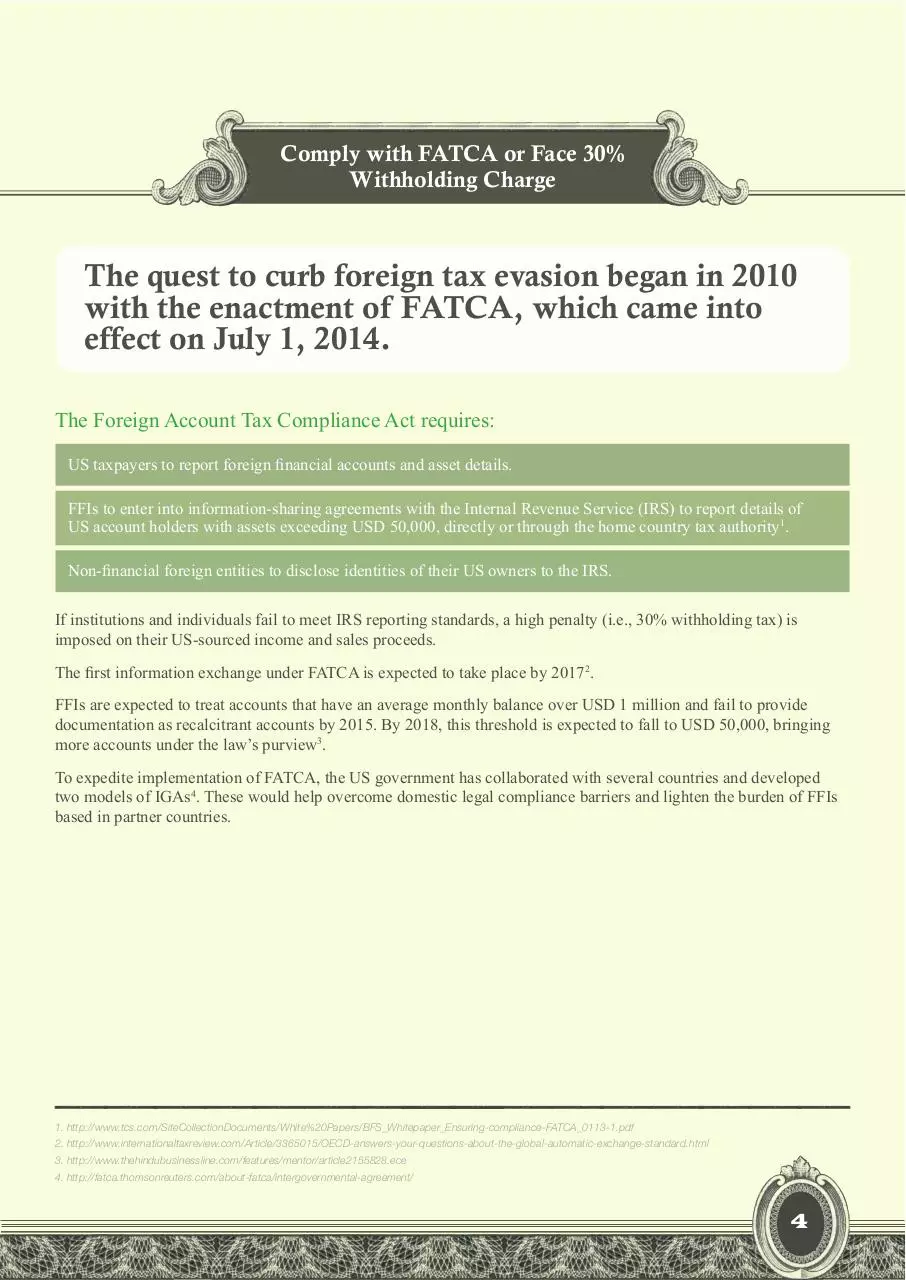FATCA High Cost Initiative To Curb Tax Evasion (PDF)
File information
This PDF 1.4 document has been generated by Adobe InDesign CS6 (Windows) / Adobe PDF Library 10.0.1, and has been sent on pdf-archive.com on 27/01/2017 at 10:04, from IP address 103.224.x.x.
The current document download page has been viewed 449 times.
File size: 1.47 MB (14 pages).
Privacy: public file





File preview
FATCA
High-Cost Initiative To Curb Tax Evasion
By The Business Research Desk
The US Foreign Account Tax Compliance Act (FATCA)
promises to cut off the routes that a lot of investors and
corporations usually take to evade taxes.
Facilitating greater reporting compliance and information
sharing among multiple tax jurisdictions, FATCA may compel
investors and institutions to reconsider investments and ways
of doing business.
However, the cost of compliance, implementation, and other
legalities may prove to be an impediment to collecting taxes
from offenders.
The contributors to this Special Report are:
Ashwin Ramakrishnan, Manager
Ankur Gajjaria, Senior Research Analyst
Mohak Marwah, Research Analyst
Larissa D’sa, Research Analyst
Sonali Salaria, Research Analyst
Deepali Sharma, Research Associate
Kedar Pandit, Management Trainee
2
EXECUTIVE SUMMARY
FATCA, a US federal law for deterring tax evasion, is arguably one of the most
controversial acts in recent times. It was enacted to identify US taxpayers having accounts
at foreign financial institutions (FFIs) and enforce reporting of those accounts through
30% withholding tax. Although its primary goal is to curtail offshore tax evasion by US
citizens, the law is expected to have far-reaching effects.
In this paper, we focus on the US government’s diplomatic success in implementing FATCA
across the world after four years of its introduction in 2010. We look at how the US has
partnered with 112 countries to develop two intergovernmental agreement (IGA) models
to expedite the process. Additionally, we try to analyze the impact of FATCA on various
stakeholders in the value chain, including governments, banks, financial institutions, IT
and consulting firms, and US citizens.
Although FATCA expects to raise billions over the next decade, we have tried to analyze
the high compliance costs borne by the entire banking system. We have discussed how this
would lead to a ripple effect, causing escalation of banking fees and breach of customer
privacy by FFIs. Furthermore, we have shed light on the increase in capital flight and US
citizenship renunciation.
This paper presents the position of major countries on FATCA. It outlines how countries
such as Canada, the Cayman Islands, and Panama pioneered the implementation of FATCA,
while India, China, and Hong Kong eventually decided to join the bandwagon despite
heavy criticism. In contrast, Russia, which considered the act an illegal intrusion on its
sovereignty, had to finally relent to share information with the IRS on client approval.
The paper also highlights how a few tax-haven countries exploited banking secrecy
laws by declining to reveal data about offshore bank accounts held by foreigners to the
corresponding national tax authorities. We see how the implementation of FATCA would
result in tax havens directly coming under its purview. Several countries have followed the
footsteps of the US, enforcing their own laws to combat tax evasion.
Hence, we can infer that the implementation of FATCA, along with similar laws, although
costly, would help curb banking secrecy and tax evasion. It would ensure transparency in
financial information exchange among nations. Although financial institutions would be
hard-pressed to implement FATCA-friendly systems and procedures, the US government
as well as IT and consulting firms would stand to gain. However, this is just the tip of the
iceberg. The efficacy of FATCA would be really tested in the coming years.
3
Comply with FATCA or Face 30%
Withholding Charge
The quest to curb foreign tax evasion began in 2010
with the enactment of FATCA, which came into
effect on July 1, 2014.
The Foreign Account Tax Compliance Act requires:
US taxpayers to report foreign financial accounts and asset details.
FFIs to enter into information-sharing agreements with the Internal Revenue Service (IRS) to report details of
US account holders with assets exceeding USD 50,000, directly or through the home country tax authority1.
Non-financial foreign entities to disclose identities of their US owners to the IRS.
If institutions and individuals fail to meet IRS reporting standards, a high penalty (i.e., 30% withholding tax) is
imposed on their US-sourced income and sales proceeds.
The first information exchange under FATCA is expected to take place by 20172.
FFIs are expected to treat accounts that have an average monthly balance over USD 1 million and fail to provide
documentation as recalcitrant accounts by 2015. By 2018, this threshold is expected to fall to USD 50,000, bringing
more accounts under the law’s purview3.
To expedite implementation of FATCA, the US government has collaborated with several countries and developed
two models of IGAs4. These would help overcome domestic legal compliance barriers and lighten the burden of FFIs
based in partner countries.
1. http://www.tcs.com/SiteCollectionDocuments/White%20Papers/BFS_Whitepaper_Ensuring-compliance-FATCA_0113-1.pdf
2. http://www.internationaltaxreview.com/Article/3365015/OECD-answers-your-questions-about-the-global-automatic-exchange-standard.html
3. http://www.thehindubusinessline.com/features/mentor/article2155828.ece
4. http://fatca.thomsonreuters.com/about-fatca/intergovernmental-agreement/
4
IGAs
Between US and Major Countries
AS OF JULY 31, 2015
The two IGA models are based on reporting processes and entities involved.
Model 1 IGA
Under this model, FFIs report FATCArelated information to domestic tax authorities. The information
is thereafter provided to the IRS by local authorities. In a few cases, reciprocal IGAs have been signed,
wherein the US provides financial information about other country’s citizens.
Model 2 IGA
Under this model, FFIs directly report to the IRS and are liable to register with the IRS. As no domestic
tax authority is involved in this model, no reciprocal IGA can be enacted.
As of April 2015, 55 countries (Model 1 IGAs: 48; Model 2 IGAs: 7) have signed IGAs with the US, while 57
others (Model 1 IGAs: 50; Model 2 IGAs: 7) have reached an agreement in substance5. Countries that have signed
an agreement in substance indicate their willingness to sign IGAs in the near future; they could avoid the penalty by
signing IGAs.
5. http://www.kpmg.com/ch/en/industry/banking/fatcacompetencecenter/pages/igastatus.aspx
5
Additional Tax Revenue, but Higher
Reporting and Compliance Costs
The US government enacted FATCA to address the deficiencies in its existing anti-money laundering
regime. According to reports, less than 7% of seven million US citizens holding foreign accounts
file tax returns6. The Association of Certified Financial Crime Specialists, a global
organization for private and public sector professionals who work in
diverse financial crime disciplines, expects FATCA to add USD 800
million7 to annual revenues for the US Treasury and generate USD 8.7
The American Citizens
billion over 2014–20248. However, the act is likely to adversely
Abroad Association has
impact the global banking system, which would incur significant
received multiple testimonies from
compliance costs of USD 190–220 billion during this period.9
overseas US citizens who have
closed their foreign bank accounts
FFIs have started discontinuing services to US clients and
and been disallowed from
divesting US assets to ease the cost pressure as well as counter
entering
into foreign pension fund or
related legal and financial risks. For instance, in 2014, VTB,
insurance
contracts.
Russia’s second largest bank, planned to discontinue services to
2,000 customers of US origin before the country enacted a last minute
law10. ICICI Bank, India’s largest private bank, has declared that it
would no longer entertain US customers.11
In a few cases, US citizens
have become unemployable
as they cannot participate
in company pension funds or
Overseas US citizens are feeling the impact of FATCA; thousands
insurance
contracts. This could have
are contemplating renouncing their US citizenship owing to
serious
ramifications
on the global
banks closing accounts or charging higher fees. In 2014, a
growth of US businesses, as overseas
record 3,415 overseas US citizens renounced their citizenship
12,13
US employees have to cope with
despite a 400% hike in renunciation fees . Moreover, FATCA is
14
limited access to foreign
negatively affecting “accidental Americans” as their accounts are
banks, pension
being closed and mortgages annulled in their native countries.
funds, and insurance
Concerns also persist regarding the 30% withholding tax, leading to some
coveragea.
countries, especially those that have not entered into IGAs with the US, to
sell US Treasuries. The sale may adversely affect interest rates and dent the
greenback’s position as the de facto global currency.
FATCA may also affect people with no links to the US, as FFIs are likely to hike banking fees of
account holders to offset high operational and compliance costs related to the act. Moreover,
a financial institution lacking money, time, or means to identify US citizens may disclose details of all
account holders to the IRS, thereby raising privacy concerns.
6. http://www.tcs.com/SiteCollectionDocuments/White%20Papers/BFS_Whitepaper_Ensuring-compliance-FATCA_0113-1.pdf
7. http://www.rjkoehler.com/2014/03/20/facta-has-arrived-and-what-it-means-for-americans-in-south-korea/
8. http://www.tcs.com/SiteCollectionDocuments/White%20Papers/BFS_Whitepaper_Ensuring-compliance-FATCA_0113-1.pdf
9. http://freedomandprosperity.org/files/fatca/OffshoreInv-FATCA.pdf
10. http://www.themoscowtimes.com/business/article/russia-s-no-2-bank-vtb-to-stop-servicing-russia-based-u-s-clients/501636.html
11. http://businesstoday.intoday.in/story/us-foreign-account-tax-compliance-act-fatca-purpose-impact/1/210816.html
12. http://blogs.wsj.com/expat/2015/02/10/record-number-of-u-s-citizenship-renunciations-in-2014/
13. http://www.theguardian.com/money/2014/sep/24/americans-chased-by-irs-give-up-citizenship-after-being-forced-out-of-bank-accounts
14. Accidental Americans: Individuals who are green card holders living overseas. They include individuals who were born in the US to non-American parents and left as
infants, but are considered US persons for the rest of their lives for taxation issues. They also comprise non-American spouses of overseas Americans and other countries'
expats living in the US, with bank and investment accounts & mortgages in their respective home countries.
a. http://businesstoday.intoday.in/story/us-foreign-account-tax-compliance-act-fatca-purpose-impact/1/210816.html
6
Significant Repercussions of FATCA for
Other Countries
The IGAs and agreements in substance signed by the US and 112 countries as well as over 80,000 FFIs have faced
criticism, legal complications, and reciprocal deals15.
RUSSIA
Heavy criticism of FATCA followed by last-minute law
Russia has been one of the most vocal critics of FATCA since its enactment in 2010.
The Russian Ministry of Finance and Rosfinmonitoring, the country’s financial
Experts foresee
intelligence unit, expressed concerns over the ramifications of FATCA on the
many
complications and
independence of the domestic financial sector. In April 2012, the ministry
cost
burdens
arising from
declared FATCA violates the sovereign equality of states. Information sharing
the law permitting Russian
by Russian banks is against the country’s laws as it entails divulging bank
institutions to share
secrets. Yury Chikhanchin, Head of Rosfinmonitoring, compared FATCA
information
with the IRS.
to a sanction, deeming it a serious risk to the Russian economy as it would
Complications include
convert the country’s financial entities into tax informants for the US16.
refusal of service to
While criticizing FATCA, Russian agencies began negotiations with the
US clients,
IRS. However, Russia’s annexation of Crimea in March 2014 resulted in
withholding tax legalities,
the US Department of the Treasury abandoning negotiations. The Russian
developing alternative payment
Banking Association had planned to discontinue services to US clients if no
systems, and de-dollarizing the
information-sharing agreement was signed before July 1, 2014. However,
Russian economyb.
a day before the deadline to register with the IRS, Russian President
Vladimir Putin signed a law permitting Russian financial institutions to share
information with the IRS only after obtaining approval from clients. Financial
institutions can discontinue services to clients that do not want their information
disclosed to the IRS.
The introduction of FATCA in Russia could lead to complications due to the following reasons:
Withholding penalty conundrum
Russian laws disallow banks to withhold money from client accounts without consent or court
order. However, FATCA requires banks to act as withholding agents on behalf of the IRS. This
could lead to affected clients claiming compensation for payment damages and interest charges on
amounts unduly withheld by Russian banks.
Long-winded information-sharing process
Russian institutions need to inform Rosfinmonitoring, the Federal Taxation Service, and the Central
Bank of their registration with the IRS within three days post registration. Foreign tax authorities
need to contact these agencies for information on overseas client accounts held in Russia;
information that has to be disclosed to the IRS would have to be sent 10 days in advance to these
agencies.
Additional costs
Russian banks could incur additional costs, as they would have to hire tax and compliance
consultants for installing internal monitoring and compliance systems as well as requisite software
for the implementation of FATCA.
15. http://www.treasury.gov/resource-center/tax-policy/treaties/Pages/FATCA-Archive.aspx
16. http://www.themoscowtimes.com/business/article/fatca-threatens-russia-s-financial-system-official-says/506452.html
b. http://www.themoscowtimes.com/business/article/putin-signs-last-minute-law-to-satisfy-fatca/502732.html
7
FATCA could dent Russia’s economy and trade ties with the US. Russia
holds a significant number of US Treasuries and engages in oil transactions
with the US, which significantly contribute to its GDP and are processed in
the US dollar. Such transactions are required to be reported to US financial
organizations. US organizations processing Russian oil transactions can
charge a 30% withholding tax to institutions not complying with FATCA.
Uncertain of the US reaction to the Crimean annexation and to avoid losses
from further sanctions, Russia sold about 20% of its US Treasuries in
March 2014. To reduce dependence on the US dollar for oil transactions,
Russia has adopted the de-dollarization strategy, which includes:
Acceptance of alternative currencies for oil sales
In May 2014, Russia signed a 30-year USD 400 billion gas
supply agreement with China. It inked another deal with China in
November 201417.
"In some ways it is more secure
than Visa; at least the Americans
can't reach it."
Russian billionaire oligarch
Gennady Timchenko on his
plans to shift all his credit card
accounts to China’s UnionPay
from Visa and Mastercard.
Mr. Timchenko has been adversely
affected by travel bans and asset
freezes by the US governmentc.
Alternative payment system
Russia is looking at developing an alternative payment system to
reduce its dependence on US payment providers Visa and MasterCard,
which account for nearly 95% of payments in the country18.
The only silver lining for Russia is the introduction of annual
reporting by FFIs on overseas accounts held by Russian citizens
and legal entities to the Federal Tax Service. FFIs would have to
disclose these details by September 30 every year.
CHINA
Clambers aboard FATCA bandwagon, introduces own version
China has signed an IGA with the US. It decided to go one step ahead by taxing citizens living and working abroad,
as part of a crackdown on tax evasion by individuals and companies. China has had its own version of FATCA since
1993, when it had undertaken an in-depth study of the US tax system. Currently, China imposes tax on citizens
irrespective of the country they reside in. Under China’s tax regime, citizens and entities are required to pay tax on
their worldwide income, not just on what is earned in China. This tax policy was introduced as more Chinese are
heading overseas to earn money.
China has been gearing up for the implementation of FATCA. In January 2015, the Guangzhou government
summoned executives from 150 of the largest corporations based in the region to a meeting to discuss tax obligations
of their overseas employees. Also, the governments in Beijing and other big cities are contacting major firms in their
jurisdictions and requesting for detailed information on foreign employees’ incomes. The State Administration of
Taxation in Beijing has launched a separate campaign to curb tax evasion by Chinese companies as they begin to
make large overseas investments.
17. http://sputniknews.com/columnists/20140725/191441744.html
18. http://rt.com/business/228883-mastercard-national-payment-system/
c. http://www.zerohedge.com/news/2014-08-01/russian-oligarchs-wave-goodbye-visa-switch-chinese-credit-card
8
With these rules, effective February 1, 2015, various international investments
deemed tax shelters have been banned. The rules are expected to indirectly
affect many wealthy Chinese individuals who invest overseas through
specially created companies, often located in the Caribbean.
"At present, Chinese
nationals represent a smaller
opportunity set for UK financial
services
firms than their American
The Chinese version of FATCA, targeted mainly at wealthy citizens who
equivalent,
although given the
stash money away in Hong Kong and other tax havens, is expected to ruffle
size
of
the
country and the
feathers worldwide. Some firms may discontinue providing services to
pace of wealth creation there
Chinese clients.
is undoubtedly scope for this
to grow in the future. Those
Maseco, a wealth management firm catering to US and French expats, had to
businesses
with the necessary
address many client concerns over FATCA. Cofounder James Sellon believes,
language
and
legal expertise
“There will be a lot of screaming voices concerning the Chinese regulation.
may well decide that the additional
The unintended consequence is the cost to the average Chinese citizen
burden is worthwhile, although smaller
living and working in a local jurisdiction who suddenly has to spend more
firms could opt not to participate if the
time and effort considering their personal investments and taxation. They
costs of so doing were unlikely to be
have to file two tax returns: a domestic plus a home country one. That adds
matched by a corresponding
to the complexity, time, and uncertainty. That also adds to an increase in
increase in revenued."
professional service and accountancy practices to account for this.19”
HONG KONG
Costly route to mainland China
Richard List
Director at Waverton Investment
Management, UK
Hong Kong has forever been a famous entry route to China for foreign businesses due to its proximity to mainland
China. Additionally, Hong Kong has a modern, friendly banking environment and a transparent legal system. US
citizens particularly have favored the region as a platform to expand operations into the mainland. However, since the
enactment of FATCA, many Hong Kong-based banks have been refusing to open accounts for, and are instead closing
existing accounts of, US individuals and corporations.
Hong Kong has fully implemented FATCA since the signing of its IGA with the
US in November 2014. However, besides the 30% withholding tax, financial
institutions in Hong Kong are subject to penalties from local authorities. Hong
A major Hong Kong bank
Kong-based banks are encountering hurdles in identifying US accounts and,
has revealed that the costs of
therefore, significantly changing their processes and technologies.
locating, monitoring, and reporting
on a US-held or -controlled
account is at least USD 7,000
a monthe.
Excluding green card holders, nearly 50,000 US citizens reside in Hong
Kong; they are required to file US tax returns20. Law firms in the region have
received a record number of enquiries for renouncing US citizenship or
green card status.
According to sources, once
the costs and benefits of
catering to clients are weighed,
All of these factors have implications for Hong Kong’s future as the preferred
only accounts with about USD
gateway to China. Singapore has already replaced Mauritius as the leading
3 million as balance are worth a
source of foreign direct investment into India. Investors have long been
bank’s time. Thus, it is easier and
comparing the advantages of the city state, its independence from China’s
more cost-effective for Hong Kong
regulatory regime, and political stability against Hong Kong’s proximity
institutions to simply close the accounts
to and strong trade links with the mainland. FATCA could tilt the scales
of, or reject applications from, US
toward
Singapore as the preferred entry route to the mainland.
clients instead of incurring high
compliance costs or
paying penalties.
19, d. http://citywire.co.uk/wealth-manager/news/what-will-a-chinese-fatca-mean-for-financial-institutions/a793098
20, e. http://beforeitsnews.com/alternative/2014/12/hong-kong-banks-shut-down-us-accounts-rather-than-deal-with-fatca-3079728.html
9
Download FATCA High Cost Initiative To Curb Tax Evasion
FATCA High Cost Initiative To Curb Tax Evasion.pdf (PDF, 1.47 MB)
Download PDF
Share this file on social networks
Link to this page
Permanent link
Use the permanent link to the download page to share your document on Facebook, Twitter, LinkedIn, or directly with a contact by e-Mail, Messenger, Whatsapp, Line..
Short link
Use the short link to share your document on Twitter or by text message (SMS)
HTML Code
Copy the following HTML code to share your document on a Website or Blog
QR Code to this page

This file has been shared publicly by a user of PDF Archive.
Document ID: 0000544466.